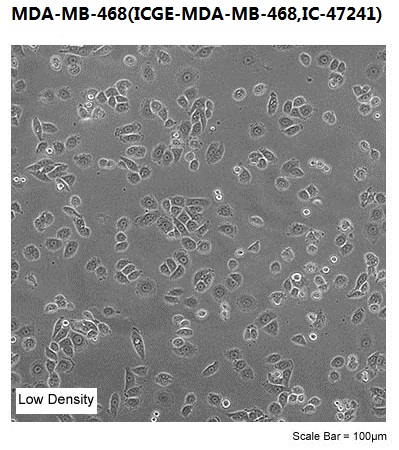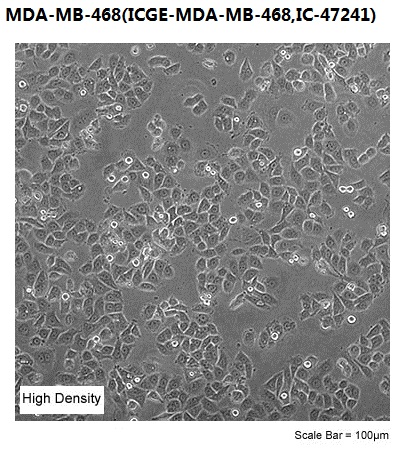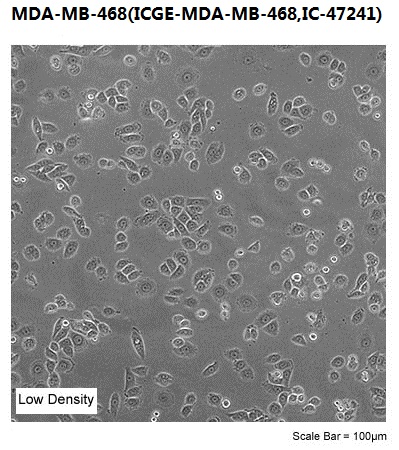


Overview
| Permits and Restrictions | |
|---|---|
| Organism | Homo sapiens, human |
| Tissue |
mammary gland/breast; derived from metastatic site: pleural effusion
|
| Product Format | frozen |
| Morphology | epithelial |
| Culture Properties | adherent |
| Biosafety Level |
1
Biosafety classification is based on U.S. Public Health Service Guidelines, it is the responsibility of the customer to ensure that their facilities comply with biosafety regulations for their own country. |
| Disease | adenocarcinoma |
| Age | 51 years |
| Gender | female |
| Ethnicity | Black |
| Applications |
This cell line is a suitable transfection host.
|
| Storage Conditions | liquid nitrogen vapor phase |
Properties
| Karyotype |
modal number = 64; range = 60 to 67. The cell line is aneuploid human, presumably female (X, abnormal X) with most chromosome counts in the hypotriploid range.; Normal chromosomes X, N2, N3, N7, N8, N10, and N22 are clearly under-represented due to their involvement in the formation of the many marker (19) chromosomes present in this cell line.; A normal chromosome N1 (or two) is identified in each karyotype, but, in addition, regions of chromosome N1 are also present in five different marker chromosomes.; Variation is evident in the normal and marker chromosome copy number from karyotype to karyotype. |
|---|---|
|
|
|
| Derivation |
The MDA-MB-468 cell line was isolated in 1977 by R. Cailleau, et al., from a pleural effusion of a 51-year-old Black female patient with metastatic adenocarcinoma of the breast.
|
| Clinical Data |
51 years
Although the tissue donor was heterozygous for the G6PD alleles, the cell line consistently showed only the G6PD A phenotype.
Black
female
|
| Antigen Expression |
Blood Type AB; HLA Aw23, Aw30, B27, Bw35, Cw2, Cw4 (patient) |
| Receptor Expression |
epidermal growth factor (EGF); transforming growth factor alpha (TGF alpha) |
| Tumorigenic | Yes |
| Effects |
Yes, in nude mice inoculated subcutaneously with 10(7) cells.
(Tumors developed within 21 days at 100% frequency (5/5).)
|
| Comments |
Although the tissue donor was heterozygous for the G6PD alleles, the cell line consistently showed only the G6PD A phenotype. There is a G -> A mutation in codon 273 of the p53 gene resulting in an Arg -> His substitution. EGF receptor is present at 1 X 106 per cell.
|
Background
| Complete Growth Medium |
The base medium for this cell line is ATCC-formulated Leibovitz''''''''s L-15 Medium, Catalog No. 30-2008. To make the complete growth medium, add the following components to the base medium: fetal bovine serum to a final concentration of 10%.
(Note: The L-15 medium formulation was devised for use in a free gas exchange with atmospheric air. A CO2 and air mixture is detrimental to cells when using this medium for cultivation) |
|---|---|
| Subculturing |
Volumes are given for a 75 cm2 flask. Increase or decrease the amount of dissociation medium needed proportionally for culture vessels of other sizes. Corning® T-75 flasks (catalog #430641) are recommended for subculturing this product.
Subcultivation Ratio: A subcultivation ratio of 1:2 to 1:4 is recommended
Medium Renewal: 2 to 3 times per week
|
| Cryopreservation |
Freeze medium: Complete growth medium supplemented with 5% (v/v) DMSO
Storage temperature: liquid nitrogen vapor phase
|
| Culture Conditions |
Atmosphere: air, 100%
Temperature: 37��C
|


